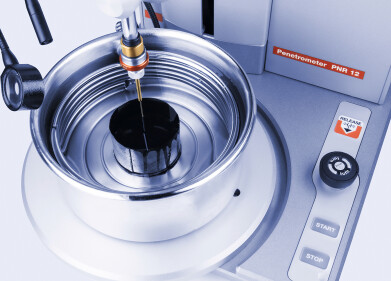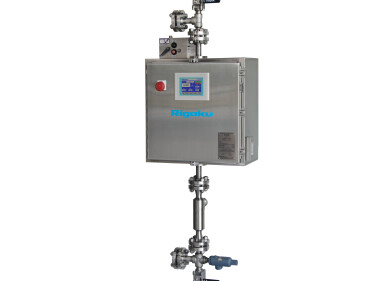Measurement and testing
Climate crisis drives urgency for live-again methane conference
Jun 01 2022
Following an extended, Covid inflicted break, the Industrial Methane Measurement Conference will return to the Ahoy in Rotterdam on 8th and 9th June 2022. “It is incredibly exciting to be able to plan a physical Conference and Exhibition again!” explains IMM organiser Marcus Pattison. “The opportunity to meet people face-to-face has been greatly missed, because there is no substitute for being there in person; sharing knowledge and experience, and having the opportunity to see the latest equipment in the exhibition. Frequently, visitors to our events tell us that the best thing about their visit was finding something they didn’t know they were looking for, and that can only be achieved by being there.
“As the world seeks ways to lower greenhouse gas emissions, the spotlight is very much on methane, so this conference could not be more timely. The IMM Conference was created to bring together regulators, environmental bodies, industrial organisations, academia and researchers, to exchange ideas and experience on the ways in which we can accurately measure methane emissions. That premise remains to this day, but its importance has never been greater.
“Covid travel restrictions in the Netherlands have been dropped, so Rotterdam is once again an easy and exciting place to travel to, and we can’t wait to welcome visitors to both IMM and the co-located PEFTEC event.”
The importance of methane monitoring has grown enormously in recent years, and following the conclusion of COP26, the measurement, management and minimisation of greenhouse gas (GHG) emissions has become an urgent global priority. Last year’s UN climate conference highlighted the insufficiency of global GHG emissions reductions provided by the Nationally Determined Contributions (NDCs) of the participating countries, so governments around the world are urgently seeking new opportunities to lower emissions.
Global methane emissions are significantly smaller than carbon dioxide (CO2) emissions, and methane concentrations in the atmosphere are about 200 times lower than those of CO2. However, as a more powerful greenhouse gas (GHG), methane accounts for more than 25% of global warming, which is the reason for the enormous attention being applied to methane emissions. Additionally, methane is less persistent in the atmosphere than CO2, so the effects of lowering methane levels are likely to have more immediate benefits. Methane emissions reduction is therefore an attractive goal and one which can only be achieved in conjunction with accurate, reliable monitoring.
Methane Measurement Conference
Chaired by Rod Robinson from the UK’s National Physical Laboratory (NPL) the first session will set the scene; describing some of the international initiatives that are currently under way, as the world seeks to lower methane emissions.
The opening presentation will be given by Brendan Devlin from the European Commission. Brendan spoke at the IMM event in 2019 and reminded delegates that in addition to the climate and environmental impacts, €30 - €36 billion of revenue is lost from methane emissions globally, and he warned delegates that if industry does not sort out methane emissions, there will be regulation to make that happen. Three years down the road, it will be fascinating to hear Brendan’s views and to learn about the Commission’s methane strategy.
The European Commission recently published a hydrogen and gas market decarbonisation package, which included proposed regulation of methane emissions reduction in the energy sector. This proposal included new requirements for the measurement, reporting and verification of emissions, as well as abatement measures including leak detection and repair (LDAR) and restrictions on venting and flaring. This followed the Global Methane Pledge, which is an international commitment, undertaken by the EU, the USA and a number of other countries at COP26, to reduce anthropogenic methane emissions by 30% by 2030 compared to 2020 levels.
Manfredi Caltagirone will help describe the global situation with regard to methane. He leads UNEP work on methane emissions in the energy sector, and is acting Head of the International Methane Emissions Observatory (IMEO) which was created last year by UNEP, with support from the EU, to drive global action on reducing methane emissions. The IMEO will initially focus on methane emissions from the fossil fuel sector, and then expand to other major emitting sectors such as agriculture and waste.
In 2014, the UNEP launched the Oil & Gas Methane Partnership (OGMP) which provides a protocol to help companies systematically manage their methane emissions from oil and gas operations. In November 2020, an updated reporting framework was launched to encourage reporting that remains directly connected to strategic action. The new OGMP 2.0 Reporting Framework is the highest standard of methane reporting, requiring companies to report methane emissions from all sources at both operated and non-operated ventures across the oil and gas value chain at an unprecedented level of accuracy and granularity.
Several of the speakers will reference the OGMP Reporting Framework, including Andris Piebalgs, part-time professor and Chair of the IMEO, who will describe global methane trends, and further explain the importance and implications of the Global Methane Pledge.
Subsequent speakers will describe the latest technologies and methods for both bottom-up, and top-down methane measurements. Case studies will also be presented in oil, gas and mining applications.
For the first time ever, anyone wishing to attend the Conference may do so completely free of charge. This also applies to those who are unable to attend in person. By pre-registering at the website both physical and virtual delegates will be able to arrange meetings, network online before the show, plan their visit, as well as contact other attendees and exhibitors. For those coming to Rotterdam it will also mean that a badge will be waiting for them, providing fast-track entry into the Hall.
Exhibition
Most of the laboratory and field-use monitoring technologies that will be discussed at the IMM Conference will be on display at the PEFTEC exhibition which runs alongside the event. Visitors will therefore be able to see the latest technologies for monitoring methane directly and remotely in fugitive, vented and partially combusted emissions from the world’s leading test and measurement equipment manufacturers.
Summary
Marcus Pattison says: “It looks like everybody is very keen to get together again – the exhibition is almost sold out and registrations are flying out! I guess it helps that the conference is now free to attend, but given the importance of methane monitoring, it is gratifying to note such high levels of enthusiasm.
“At previous IMM Conferences, there has been standing room only, so I cannot emphasise the importance of pre-registration highly enough.”
Rod Robinson concurs: “Following COP26, countries and organisations are vigorously seeking GHG emissions reduction opportunities. For example, in March 2022, the U.S. Securities and Exchange Commission (SEC) proposed major rule amendments to the disclosure of climate-related risks and opportunities for public companies, which would mandate the requirement to report GHG emissions, and similar initiatives are underway in Europe.
“International initiatives such as the Global Methane Pledge will mean that the focus of the IMM Conference will be to share knowledge and experience to ensure that methane monitoring is accurate and reliable, so that reduction measures can be effective.
As a major contributor to global warming, and with lower atmospheric persistence than CO2, methane represents an attractive opportunity for GHG emissions reduction, and of course, that can only be achieved alongside, accurate, reliable methane measurements, so we are very much looking forward to welcoming delegates to Rotterdam in the pursuit of that goal.”
Digital Edition
PIN 25.5 Oct/Nov 2024
November 2024
Analytical Instrumentation - Picturing Viscosity – How Can a Viscometer or a Rheometer Benefit You? - Sustainable Grease Formulations: Evaluating Key Performance Parameters and Testing Method...
View all digital editions
Events
Jan 20 2025 San Diego, CA, USA
Jan 22 2025 Tokyo, Japan
Jan 25 2025 San Diego, CA, USA
SPE Hydraulic Fracturing Technology Conference and Exhibition
Feb 04 2025 The Woodlands, TX, USA
Feb 05 2025 Guangzhou, China




















